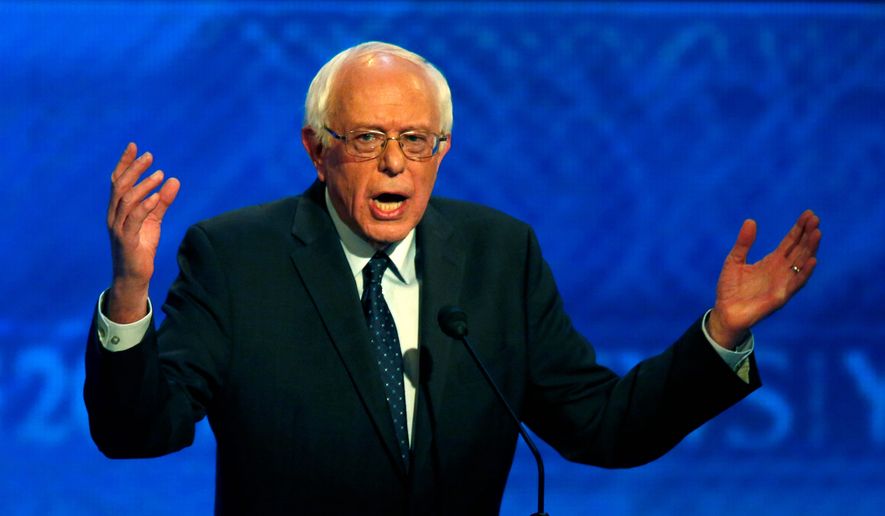The timing of this year’s early primaries should work to the advantage of Sen. Bernard Sanders of Vermont, whose college student fans will be back on campuses in Iowa and New Hampshire by the time the first voters go to the polls.
For the past three cycles, the Iowa caucuses have come just after New Year’s Day and New Hampshire’s primary followed close behind, when students are usually still at home, on family trips or doing short overseas study trips.
But Iowa this time holds its caucuses Feb. 1 and New Hampshire’s primary is the following week — all a boon for a campaign that heavily relies on students for manpower.
“Bernie Sanders’ strength on college campuses might get an extra boost from the delayed caucus season — where he could win, or be a very close second place in Iowa,” said Democratic strategist Jamal Simmons.
The connection between Mr. Sanders and students is palpable.
“Students are definitely attracted to Sanders, there’s a real presence for him on our campus, [and] he’s attracting a young crowd,” said Christopher W. Larimer, a professor of political science at the University of Northern Iowa.
He said the real challenge will be to make sure those students are registered, able to vote and turn out on caucus night, which requires significantly more time and dedication than voting in an election.
“If they’re organizing and registering kids on campus, I would expect Sanders to do very well,” Mr. Larimer said.
The College and Young Democrats of Iowa is trying to make sure students are prepared. In August the organization started registering first-time voters so they could caucus near their school rather than travel back home — making it easier on the young recruits.
Although the group hasn’t officially endorsed a candidate, the registration efforts are certain to aid Mr. Sanders, who has proved strikingly popular with younger voters.
Of voters born after 1980 — the so-called millennials — who gave themselves at least a fair chance of voting in the Democratic primary this year, Mr. Sanders won 41 percent support. Hillary Clinton trailed at 35 percent in the poll by Harvard University’s Institute of Politics, released earlier this month.
“Sanders’ campaign is putting in a lot of effort with the younger supporters, and they are on the ground with many local colleges here,” said state Sen. Tony Bisignano, Des Moines Democrat. “I know there’s a massive amounts of people coming to work with him on the campaign here, and there’s a big drive at turning out people for the caucus.”
The youth vote is what catapulted President Obama over Mrs. Clinton in the 2008 primary contest, and particularly helped him win Iowa’s caucuses, in which he captured 57 percent of the vote of those younger than 30.
Those voters made up a little more than one-fifth of the caucus turnout in 2008, when a majority of college students were back home, not being pressured to go out on caucus night by like-minded, activist college friends.
Mr. Sanders is prepared to repeat Mr. Obama’s feat against Mrs. Clinton.
“Bernie has the student vote, there’s no doubt,” said Joyce Weston, the Democratic Party chair in Grafton, New Hampshire.
Ms. Weston has been working with the Democratic student groups at nearby colleges to arrange voter registration on campus and to provide a bus service on primary day to pick students up and deliver them to their polling station.
“They might not be registered to vote, but in our state you can register the day of the election,” Ms. Weston said. “So what we’re going to do with the schools is to pick students up at the student union and drive them to the polls. We’ll register them right there. We’re going to be making a real effort to turn out this vote.”
Mrs. Clinton, understanding that college students derailed her 2008 bid for the White House, has taken steps to try to limit her vulnerability. A super PAC aligned with her has hired Mr. Obama’s former youth-vote coordinator to oversee outreach to voters ages 16 to 30, with a particular focus on those still in school.
The group is organizing in Iowa, teaching college students how to get involved in the caucus process, training them on how to become precinct captains and how to get out the vote on caucus day.
Still, some question whether young voters will be willing to leave school grounds to caucus with neighborhood locals.
“Caucusing is a time-consuming process, which includes talking with the neighbors, and it’s been difficult for political parties to get college students in particular to caucus because it requires pulling them off campus and trying to get them to connect with people they’re not connected with,” said Rob Boatright, a political science professor at Clark University in Worcester, Massachusetts.
“But in the case of primaries, a delayed New Hampshire primary will probably drive greater college student turnout and benefit Sanders,” he said.
Nevertheless, the students in Iowa who support Mr. Sanders seem quite motivated, and shouldn’t be underestimated, party leaders say.
“I can see a very close contest, part of the reason [being] his supporters are very dedicated, and these people are taking his message to heart,” said Larry Hodgen, chairman of the Cedar County Democrats in Iowa. “They’re more enthusiastic than the Hillary people, and enthusiasm drives you to caucus.”
• Kelly Riddell can be reached at kriddell@washingtontimes.com.




Please read our comment policy before commenting.